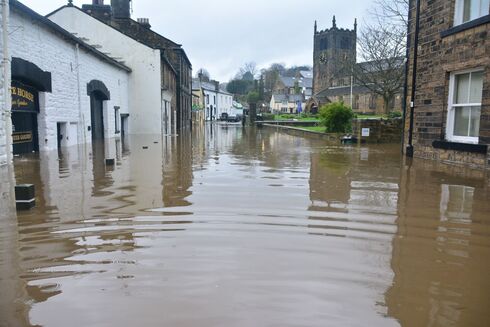
Flood Week highlights risks and safeguards
20 November 2023

It’s often been said on the blog that extreme weather conditions caused by climate change will lead to increased demand for products and services from hire companies to help with related recovery work.
This has been shown yet again over recent weeks in the wake of the storms that affected much of the country which led to floods and damage from fallen trees.
One hire industry supplier told me recenty that they had received an order for no fewer than 50 pumps from an independent hirer in Ireland to deal with the aftermath.
And this week the Environment Agency is running its annual awareness campaign, Flood Action Week, to highlight the risks and measures that can be taken to mitigate them.
The organisation says that around 5.5 million homes and businesses in England are at risk of flooding and that one of the key messages of the COP28 summit, which gets underway in the United Arab Emirates on 30 November, is that the globe must prepare for the effects of increasingly extreme weather.
Data published elsewhere this month by the Copernicus Climate Change Service shows 2023 is near certain to be the warmest year on record.
According to the Met Office, Storm Babet saw the third-wettest independent three-day period in a series for England and Wales since 1891, while the Midlands provisionally recorded its wettest ever three-day period. Around 2,100 properties were flooded.
Alan Lovell, Chair of the Environment Agency, said: “Knowing just one action can reduce the effects on your home and family and even save lives. Anyone can go online to check if they are at risk, sign up for Environment Agency warnings and, crucially, know what they need to do if flooding hits.”
Research shows that planning ahead to mitigate the impacts of flooding can reduce the damage to homes and possessions by around 40%.
Flood Action Week, running from 20 to 26 November, is reminding people that to prepare for future flooding they should: take steps to protect against future flooding; sign up for flood warnings by phone, text or email; and check the long-term flood risk from local rivers, the sea, surface water, reservoirs and groundwater.
The Environment Agency says that approximately 3.4 million properties in England are at risk of surface water flooding in particular, which generally occurs after heavy rainfall in urban areas, when water cannot drain away or soak into the ground.
The average cost of flooding to a home is estimated at around £30,000 and the mental health impacts are long lasting.
Preventative measures can reduce the risk of flood damage to individual homes, speed up repair work and help people move back into their properties more quickly after a flood. These can include raising electrical sockets and white goods away from floor level, installing self-closing air bricks and flood resistant doors, and replacing flooring with waterproof tiling and grout.
The Environment Agency says research shows that such actions can limit the cost of repair work for properties by as much as 73% after a major flood.
Nevertheless, following past experience, it’s likely that many homeowners and businesses will not implement such measures, and so the demand for pumps, dryers, dehumidifiers and heaters from hirers to deal with the aftermath of extreme weather events will remain.
Photo: Chris Gallagher

